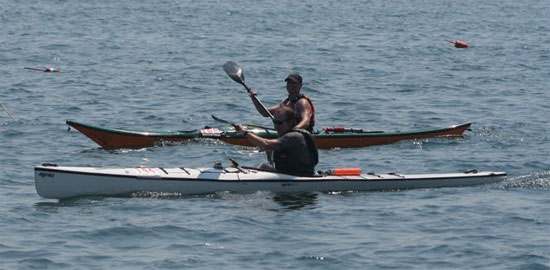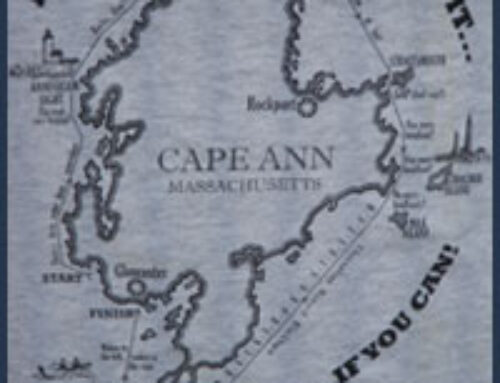It is axiomatic that in almost any race, the lighter you are the faster you go. At about 8.3 pounds per gallon, a small amount of water can be deceptive. Twelve gallons in your boat becomes a hundred pounds of slippery, shifting payload. Not only have you acquired a load that drags down your speed, you also have a significant maneuverability issue. There is now a demon in your boat called dynamic instability, an unseen hand with contrary intentions that retards or accelerates the forces of heave, surge and sway as you try to make corrections about the longitudinal, lateral and vertical axes of your frail vessel. With your center of gravity in constant motion you must alter your inputs accordingly. You become a very busy man. Thus my distress on a beautiful summer day outside of Gloucester harbor, sitting in a featherweight kayak negotiating large boat wakes with an aquarium in my cockpit.

They say that the Blackburn Challenge is to boat people what the Boston Marathon is to runners. If able, it is something you must do at least once. It is billed as a 20-mile open-water ocean race, although the first three miles are actually in the shelter of the Annisquam River. It is a clockwise circumnavigation of Cape Ann, Massachusetts which begins on the river behind Gloucester High School, home of the Fighting Fishermen. Prior to the race, the Captain’s Meeting is held inside the cafeteria. This year marked the 24th year of competition. Three hundred and eleven boats were launched into the salty fray of this nautical tradition.
Annisquam lighthouse stands at the entrance to the river. It is one of six you will pass, with names like Straitsmouth and Tenpound. The twin lights of Thatcher Island were built under British rule in 1771. It is scenic beyond description. This is where they come to make postcards. The course leads you around the windswept edge of Halibut Point, beneath stony cliffs, past the sharp, rugged shores of Rockport, and between small islands and headlands on the way back to Gloucester harbor and the finish line at Greasy Pole.
Gloucester declares itself the oldest seaport in America. It was the home port of the Andrea Gail which was lost in October 1991 and memorialized by Sebastian Junger in his book “The Perfect Storm”. His narrative documents the havoc wrought when three storms merged to create waves of 100 feet. It was the largest storm to hit Gloucester in recorded history.
The Challenge gets its name from Howard Blackburn, who became separated from his fishing fleet in 1883. His subsequent ordeal is chronicled in “The Lone Voyager”, by Joseph Garland:
“Like countless Gloucester fisherman before and since, Howard Blackburn and Tom Welch were trawling for halibut on the Newfoundland banks in an open dory in 1883 when a sudden blizzard separated them from their mother ship. Alone on the North Atlantic, they battled towering waves and frozen spray to stay afloat. Welch soon succumbed to exposure, and Blackburn did the only thing he could: He rowed for shore. He rowed five days without food or water, with his hands frozen to the oars, until he spied the coast of Newfoundland. Yet his test had only begun.”
Despite the loss of fingers and toes due to frostbite, Howard eventually went on to cross the Atlantic solo, earning the moniker of “fingerless navigator.”
The race around the Cape was well organized. To relieve congestion, the start was accomplished in waves separated by five minute intervals. Over twenty five classes of racers were represented. We began at eight-thirty, with the surfski jockeys behind us at 0835.
After meandering down the river past smiling well-wishers and boats at anchor, we entered the ocean and turned north towards Hodgkin’s Cove. Kayaks were strewn the length of the course like flotsam, except that wreckage exhibits more order and unity. This wad of bobbing paddlers was carefully traversing a minefield of lobster pot buoys when the sea was suddenly and cleanly parted as the surfski boys knifed through the middle like a pack of sharks on the hunt. The leaders were in a tight diamond, riding bow and stern wakes for every calorie of advantage and moving as one unit. The rest followed in a perfect arc like speed skaters on ice. Their frantic urge to sprint ahead was steadily repressed, quietly transformed into perfect rotation with every stroke while keeping the cadence of a metronome. It was frenzy, but so finely tuned and carefully metered. Only their eyes betrayed the intensity of effort and the degree of concentration. It is one thing to be a spectator at a sporting event and appreciate the grace of a professional. It is something else altogether to be close enough to knock ‘em out of the boat. To be shoulder to shoulder, if only for a moment, is hard to convey.
About three miles from the finish, the offshore chop increased, an omen of the building clapotis in the harbor wrought by fishing vessels, swells and recreational boat traffic. At this worst possible moment I chose to get sloppy, went into the back seat and soon discovered the cool, green ocean of those higher latitudes. Under the right circumstances it would have been quite refreshing. In this case, it meant I got to pull an extra hundred pounds of water all the way to the finish. So, while I honed my remount skills, Lisa Huffington continued past in her deliberate if not plodding manner and took second place for the women’s division, beating me by 42 seconds in a twenty-mile race. She took a medal back to the house. I brought home a chafed butt. Meanwhile, Pam Browning won her division in a yak that, from a purely cosmetic standpoint, shares some characteristics with my truck. These women are simply awesome. If there is value in humility I’m indeed a wealthy man.
Blackburn was not a personal triumph. It was much more than that. It was a celebration of this brief, sublime life. Regardless of what the published results might suggest, there were no losers at this race. No matter how beleaguered by failure elsewhere, for one summer morning around Cape Ann they were all champions.
Someone once said, “We are privileged to live another day in this magnificent world”. We certainly are. Paddle strong. ~ Rick

Leave A Comment
You must be logged in to post a comment.